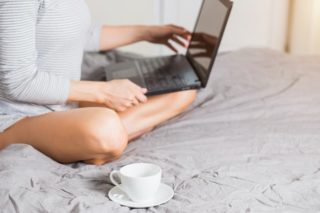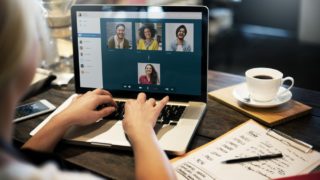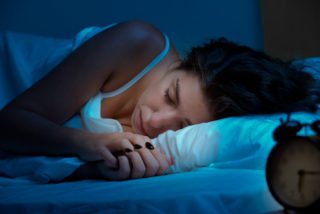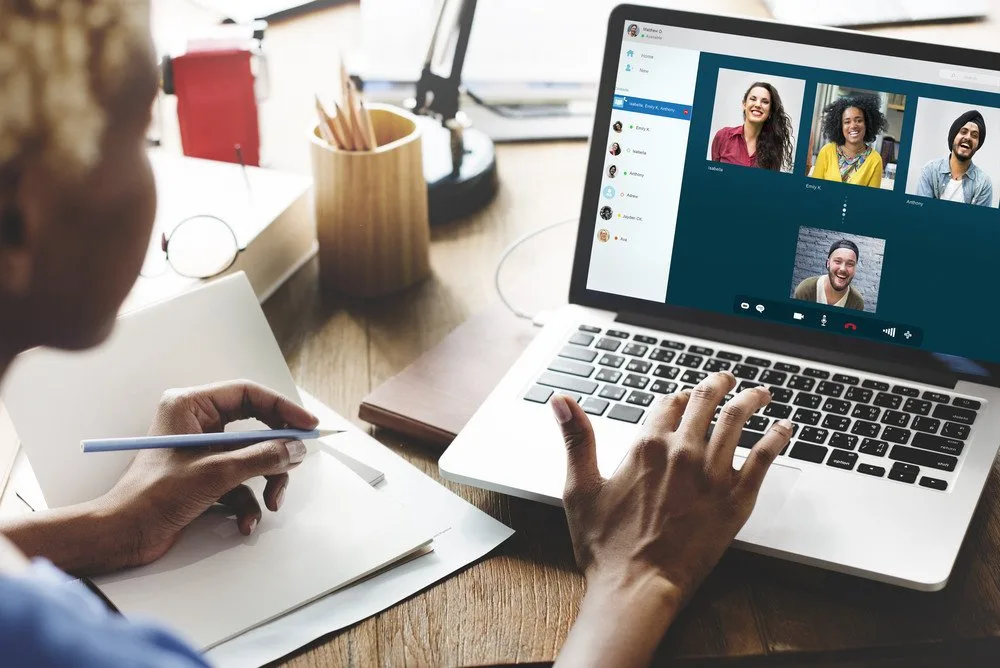A 2019 report found that most people, on average, spend three hours and 15 minutes on their phones a day, with the top 20% of smartphone users having daily screen time in excess of four and a half hours. Now considering we are now using our devices to either work from home, pass the time, or keep up with the latest statistics, these numbers have definitely risen. So why the concern? Well, as essential as our devices have become to our lives, they’ve also introduced our skin to its biggest enemy – blue light.
With all the extra time that we’re now spending at home, there’s one thing that’s skyrocketed as a result – our screen time. Whether it’s back-to-back ZOOM meetings, hour-long conversations on HouseParty, or just catching up on your favorite show on Netflix – we can’t seem to put our screens down during lockdown. With that said, one has to wonder what all the exposure to blue light is doing to our skin.
What Is Blue Light?
Blue light, also known as high-energy visible light (HEVL), is a form of light that is emitted by the sun.
Now, while sunlight is its main source, it can also be emitted from fluorescent and LED bulbs and display screens of your favorite electronic devices. Additionally, blue light is also the light of choice used as part of light therapy.
How does blue light affect the skin?
Blue light has the ability to penetrate deeper into the skin when compared to both UVA and UVB light, and this can have adverse effects on the skin’s appearance.

Tekijä Stockshakir/Shutterstock
Yes, sunlight is the main source of blue light, but not only are we now spending more time on our devices as a result of quarantine regulations, but our phones are much closer to us than the sun. This “close-up” can trigger oxidative stress – which we know promotes skin aging.
How does blue light age us?
1. It affects our sleep
The term beauty sleep isn’t just a phrase that we love to throw around. In fact, sleep is one of the best skincare hacks that everybody should be doing as well as they can. Not getting enough quality sleep can leave us with tired and dull skin. Additionally, researchers have also found that lack of quality sleep was linked to more wrinkles and fine lines (1).
So, how does blue light affect our sleep patterns?
We all have a circadian rhythm, which is a system in the body that operates our sleep-wake cycle. Our circadian rhythm is linked to light exposure and this is why it’s not always advisable to go to bed with your phone. Doing so may disrupt your circadian rhythm, which in turn disrupts your sleep patterns.
What’s more, research has also suggested that a disrupted circadian rhythm can also increase the risk of diabetes, heart disease, and obesity.
Moreover, one study found a strong link between high light exposure at night and lower levels of melatonin (the sleep hormone) production.
2. It can cause pigmentation issues
This type of light may trigger the skin to produce excessive melanin and this can result in discoloration, dullness, and uneven skin tone.

Tekijä Rawpixel.com/Shutterstock
A study published in the Journal of Investigative Dermatology looked at 22 participants with a wide range of skin tones. The researchers found that the damaging effects of blue light were more pronounced in participants with darker skin tones. In fact, participants with lighter skin tones had a 4.3% increase in pigmentation damage, whereas participants with darker skin tones experienced an increase of 18.1%.
3. It may cause wrinkles
As mentioned, blue light can penetrate deep into the skin, all the way to where collagen and elastin live. These two proteins help to keep the skin supple and wrinkle-free, and any disruption can promote signs of aging.
That said, research has found that oxidative stress triggered by blue light can result in the breakdown of collagen.
What about our vision?
Macular degeneration is one of the leading causes of blindness in the United States and, according to the University of Toledo, blue light may increase the risk for macular degeneration.
“It’s no secret that blue light harms our vision by damaging the eye’s retina,” said Ajith Karunarathne, PhD, assistant professor at the university’s Department of Chemistry and Biochemistry. According to the professor and his team, while they caution the public from believing that it may cause blindness, blue light has been found to damage retinal cells.
But is all blue light bad?
Not at all.
First, as we know, sunlight exposure is the number one source of blue light, and we need the sun to maintain healthy vitamin D levels.
Additionally, blue light is often used as a therapy for skin disorders such as acne, as well as to treat seasonal affective disorder symptoms (2).
How can I monitor my blue light exposure?
1. Avoid using your device before bedtime
Blue light can affect your sleep pattern, so it is advisable that you avoid using your devices 2 to 3 hours before going to sleep. It’s also best to keep a TV out of your bedroom.
2. Install blue light apps
In recent years, more and more apps have become available for electronic devices, and these apps help to reduce the amount of blue light being emitted from the devices they are installed on. Additionally, your phone should also have a blue-light setting.
3. Include antioxidants in your skincare
Antioxidants help to protect the skin from the damaging effects of free radicals. Antioxidants such as vitamin A, C, and E can help prevent blue light damage, so it’s best to invest in a broad-spectrum sunscreen loaded with antioxidants.
4. Screen breaks
It’s also important to take regular breaks from your screen. Yes, you need your device to do your work and stay in touch with friends and family. There’s no reason why you should spend all day on them. Rather:
- Set limits
- Adopt a hobby
- Read a book
- Ask yourself if the ZOOM meeting can be resolved through an email.
- Reduce the number of ZOOM meetings per day.
- Don’t watch an entire Netflix show in one sitting.
Final Thoughts
Yes, we need our devices. However, that doesn’t mean that we should let the effects of blue light disrupt our health. Thankfully, there are ways to still use your favorite devices and protect your health at the same time.
Read more
Quarantine fatigue is real. Here are some helpful ideas to help you manage. Read more.





![women [longevity live]](https://longevitylive.com/wp-content/uploads/2020/01/photo-of-women-walking-down-the-street-1116984-100x100.jpg)










